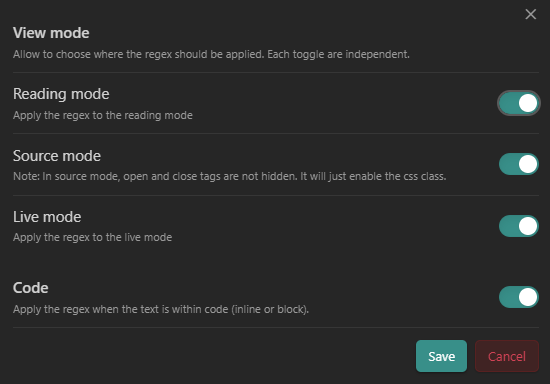Obsidian Regex Mark is a plugin for Obsidian that allows to add custom CSS classes to text based on regular expressions.
Add a regular expression and a CSS class to the plugin settings. The plugin will then add the CSS class to any text that matches the regular expression.
The contents of the regex will be added to the span tag with the data-content attributes for a more granular styling.
The following regular expression will add the CSS class comment to any text that matches the regular expression.
regex: //.*$
class: comment
And the following text:
This is a normal line of text. //This is a comment.will be converted to:
<p>This is a normal line of text. <span data-contents="//This is a comment." class="comment">//This is a comment.</span></p>It is also possible to create "custom" Markdown tags using the {{open:regex}} and {{close:regex}} syntax. You need to toggle the option hide to enable it.
Note
The usage of __ for underline (ie __text__) is not supported in reading
mode, but works well in Live Preview!
The plugin will mimic the behavior of Obsidian with transforming:
__text__to:
<span class="underline" contenteditable="false">
<span>
<span class="cm-hide">__</span>
<span class="underline">this is a normal text with underline (in LP)</span>
<span class="cm-hide">__</span>
</span>
</span>The css will after hide the .cm-hide class, unless you select it (only in livePreview for the selection).
Selecting the text will show everything, like with other markup.
 You can disable "per view" the regex, aka, disabling for:
You can disable "per view" the regex, aka, disabling for:
- Reading mode
- Live Preview mode
- Source mode
Each toggle are independent, so you can disable for reading mode, but enable for live preview mode.
You can also disable/enable a snippet within code (code-block or inline, between backticks), with toggle "Code".
This setting allow to change the default {{open:}} and {{close:}} tags to something else, allowing to use the } (for example) as an opening/closing (ie {regex} can be recognized and stylized). When the tags are changed, the regex are automatically updated to use the new tags. If a regex is broken, it will be disabled in all view, and a warning will be displayed in a Notice.
You can share your regexes with other people without manually sharing the data.json using the import / export feature. You can also use it to back up your regexes.
The settings also port the open/close tags, so you can share the settings with the tags you use. Manual regex in object format can also be imported, and they will be added to the list.
You can then use the CSS class to style the text in your CSS snippet or any other usages. You can even import or export settings from others!
- Underline :
{{open:__}}(.*){{close:__}} - SuperScript :
{{open:\^}}(.)(Note: It works for "one" character only here, but you can use^x^syntax if you want to use for more text:{{open:\^}}(.*){{close:\^}}) - SubScript :
{{open:_}}([a-zA-Z\d]\b))(As before, it works for only one element)
The css for the above example is:
.superscript {
vertical-align: super;
font-size: 90%;
}
.subscript {
vertical-align: sub;
font-size: 90%;
}Warning
If your Obsidian refuse to open a file, and you get this error in the console:
RangeError: Decorations that replace line breaks may not be specified via pluginsThat's mean that one of your regex doesn't work inside Obsidian. You need to check every regex you have added to find the one that cause the issue and delete it, and reload Obsidian to make it work again. I tried to find a way to catch the error and display it in the console, but I didn't find a way to do it... So, if you have any idea, I'm open to suggestions!
- rien7: Original work
